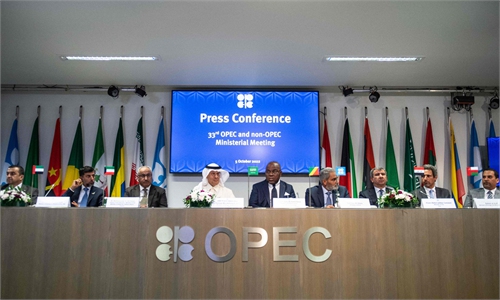
Illustration: VCG
US Treasury Secretary Janet Yellen criticized the Organization of the Petroleum Exporting Countries (OPEC) and its allies' choice to cut oil output as "unhelpful and unwise" for the global economy, The Financial Times reported on Sunday."We're very worried about developing countries and the problems they face," she said.
While Yellen seemed to be concerned about how the emerging markets will respond to high energy prices, it is crystal clear whether it is the US economy or developing countries she was really worried about. If the US had truly cared about developing countries, the Federal Reserve would not have enacted such aggressive rate hikes, which have triggered capital outflow and financial turmoil in many countries this year.
The move by OPEC+ could serve as the beginning of a major change in the global oil supply and demand pattern. With many countries around the world still facing an energy crisis, Saudi Arabia, Russia and other oil exporters should further coordinate with China, India and other developing countries on oil supply issues. This is because developing countries are often unable to compete with Western countries for energy supplies and thus are forced to deal with energy shortage.
The Biden administration's annoyance with the OPEC+ move is because the production cut undermines the US' interests. The higher oil prices as a result of production cuts will mire the US in high inflation and facing higher energy costs, dealing a blow to Biden's efforts to stabilize prices before the mid-term election. Also, Russia may benefit from the production cut with increased revenue from oil sales, weakening the effect of Western sanctions.
More importantly, the OPEC+ organization's recent decision may mark the beginning of the US losing its control over the global oil market. Although a White House statement said that Biden had directed the Department of Energy to release another 10 million barrels from the Strategic Petroleum Reserve next month in an effort to lower energy prices, it is worth noting that with the depletion of the strategic oil reserves, the US will increasingly cede control of the global oil market to OPEC+.
Fundamentally speaking, the days when the US called the shots over the global oil market are gone. The OPEC+ organization's choice to cut oil output despite US opposition is a clear indication that these oil-exporting countries are no longer willing to yield to the US' global strategy.
From the perspective of OPEC+ countries, global energy demand has contracted due in large part to the Fed's rate-raising spree as well as the deterioration of the Russia-Ukraine situation. With global oil prices suffering considerable losses since the August peak, it is their right to protect their own interests and adjust production based on demand.
If anything, Saudi Arabia and other oil-exporting countries' decision to shrug off US pressure and act in their own commercial interests is a sign of their deteriorating confidence in the US, reflecting the weakening of US hegemony in the region.
The oil production cut by OPEC+ shows that Russia and Saudi Arabia have been coordinating on oil production adjustment under the mechanism. Since the outbreak of Russia-Ukraine conflict, China and India have been big buyers of Russian oil and have used non-dollar currencies for settlement. With other developing countries likely to face energy supply and settlement challenges as a result of the Fed's strong dollar policy, the urgency for them to strengthen energy coordination is increasing.
But it should be pointed out that strengthened energy coordination among developing countries doesn't necessarily mean that they will take sides in the Russia-Ukraine conflict or Western sanctions against Russia. The fundamental purpose of such coordination is to help the developing world, especially poorer countries, pull through the energy crisis so that the world economy can continue to move forward smoothly.



